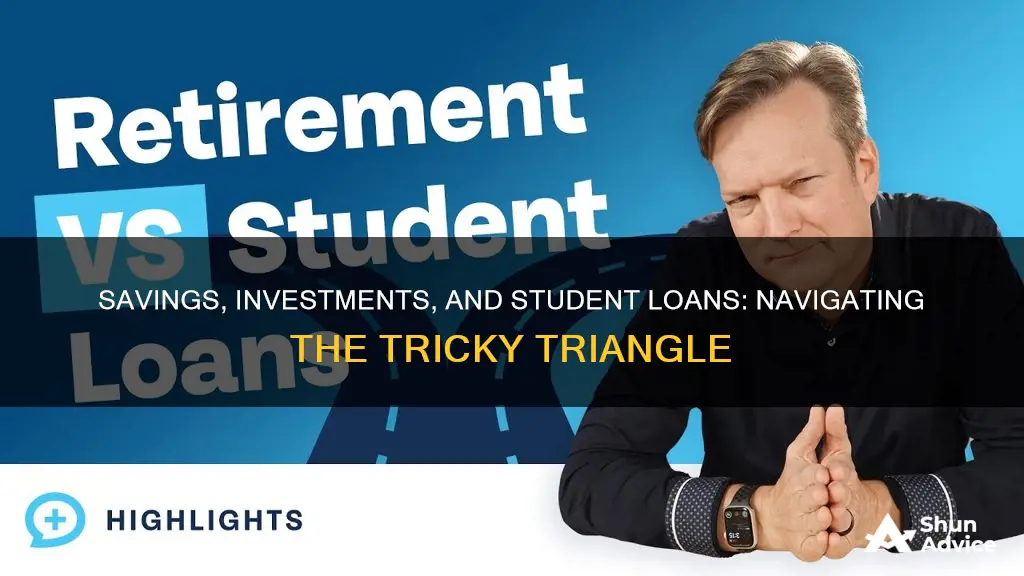
Whether you should use savings and investments to pay off student loans depends on your financial priorities and which option gives you a better return. If you have high-interest student loans, it's generally recommended to pay those off first. However, if you're in a loan forgiveness program or have a low-interest rate, investing may be a better option. It's important to consider factors such as your cash flow, loan rate, tax benefits, and employer assistance when deciding between paying off student loans and investing.
| Characteristics | Values |
|---|---|
| Interest rate on student loans | The higher the interest rate, the more you will save by paying off the debt as soon as possible. |
| Interest rate on investments | If your expected rate of return on investments is higher than your student loan interest rate, investing could be a better option. |
| Financial goals | If your goal is to become debt-free quickly, putting your extra money toward removing student debt is ideal. |
| Cash flow | If you have a high income, you may be able to pay off your student loans and invest. |
| Debt-to-income ratio | Paying off student loans can lower your DTI ratio, making it easier to qualify for a mortgage. |
| Emergency fund | It is recommended to have at least 3-6 months' worth of expenses saved up for emergencies before paying off student loans or investing. |
| Retirement savings | It is important to balance paying off student loans with saving for retirement, especially if your employer offers a 401(k) match. |
| Tax benefits | The tax savings from saving for retirement may outweigh the interest costs on a student loan. |
| Employer assistance | Some companies offer student loan repayment assistance, which can free up funds for retirement savings. |
What You'll Learn

The pros and cons of paying off student loans early
Pros
- Save on interest: The earlier you pay off your student loans, the less interest you will have to pay in the long run.
- Get out of debt faster: Paying off your student loans early means you will be debt-free sooner, which can be a huge weight off your shoulders.
- Lower your debt-to-income ratio: A lower debt-to-income ratio can make it easier to get approved for other types of credit, such as a mortgage or car loan.
- Peace of mind: Knowing that you are debt-free and that all the money you earn is yours to spend can be incredibly freeing and give you much-needed peace of mind.
Cons
- Higher interest rates on future loans: Student loans tend to have lower interest rates than private loans. If you pay off your student loans early and then take out another loan, you will likely pay a much higher interest rate.
- Forfeit tax advantages: Interest on student loans is tax-deductible, but only up to a certain amount each year. If you pay off your student loans early, you may miss out on this advantage.
- Drain your emergency fund: It's important to have savings set aside for unexpected expenses. If you use all your savings to pay off your student loans early, you may not have a financial safety net if something goes wrong.
The Debt Dilemma: Navigating the Path to Financial Freedom
You may want to see also

The advantages of investing in the stock market
Investing in the stock market has several advantages, and while it may be a risky move, it can be a great way to make your money work harder. Here are some of the key advantages:
Higher Returns
The stock market has historically delivered generous returns over time. While there is a possibility of both profit and loss, stocks have outperformed cash investments in the long run. For instance, a Barclays Equity Gilt Study found that since 1899, British stocks have returned an average of 4.9% annually, compared to 0.7% for cash. Stocks kept for any ten-year period have had a 91% chance of outperforming cash.
Beating Inflation
Stocks are a great way to stay ahead of inflation. Over the long term, stocks have typically yielded higher returns than the average annual inflation rate.
Compound Interest
Compound interest is a powerful tool that helps your money grow faster and faster over time. The longer you invest, the more your money will make for you.
Tax Benefits
In many places, including the US, taxes on capital gains from stocks are deferred until you sell. This means you can delay paying taxes on your profits, which can significantly boost your investment power. Additionally, if you hold stocks for more than a year, you may benefit from the more favourable long-term capital gains tax rate.
Liquidity
Stocks are considered liquid assets, meaning they can be easily converted to cash. The stock market allows you to sell your stocks at any time, and with low transaction costs. This is especially beneficial if you need quick access to your money.
Diversification
Investing in stocks allows you to diversify your investment portfolio. By investing in different types of assets across various sectors and geographies, you can reduce your overall investment risk. If one type of stock or asset decreases in value, your entire portfolio is not significantly impacted.
Ownership and Voting Rights
When you buy stocks, you essentially own a piece of the company and become a shareholder. This gives you certain rights, such as the ability to vote on company decisions and receive annual reports.
Dividend Income
Many companies pay dividends to their investors, which can provide a steady stream of income. Dividends are typically paid quarterly and can be a great way to fund retirement or reinvest in other opportunities.
Accessibility
Investing in the stock market is now more accessible than ever. You can easily buy and sell stocks online through a broker or financial planner, and some brokers do not require account minimums or commissions.
Taking Advantage of a Growing Economy
As the economy grows, corporate earnings tend to increase. Investing in stocks allows you to benefit from this economic growth by investing in businesses influenced by economic growth.
The Dividend Dilemma: Exploring Investment Options
You may want to see also

The benefits of a 401k
A 401(k) is a popular investment vehicle for retirement planning. Here are some of the benefits of a 401(k):
Tax Benefits
K) plans offer valuable tax advantages. Contributions are typically made on a pre-tax basis, meaning they are deducted from your income before your income tax is calculated. This lowers your taxable income for the year, which can result in a smaller tax bill. Additionally, your savings and investments within the 401(k) grow tax-free until you withdraw them during retirement, when you may be in a lower tax bracket.
Employer Matching
Many employers offer to match employee contributions up to a certain percentage or dollar amount. This is essentially free money that helps your nest egg grow even faster. Employer matching is a great perk that should not be overlooked when considering a 401(k).
High Contribution Limits
K) plans have higher contribution limits compared to other retirement accounts, such as IRAs. For 2024, the contribution limit for a 401(k) is $23,000, with an additional $7,500 allowed for those aged 50 or older. These limits far exceed the contribution caps for IRAs.
Flexibility
A 401(k) plan offers flexibility in terms of contribution amounts and investment options. You can contribute as much or as little as you want, and you have control over how your money is invested. Additionally, if you change jobs, you can roll over your 401(k) to your new employer's plan or another qualifying retirement account.
Creditor Protection
K) plans offer protection from creditors, including the IRS, in most cases. This means that your retirement savings are generally safe from judgment creditors and federal tax liens.
Overall, a 401(k) is a powerful tool for retirement savings, offering tax advantages, high contribution limits, employer matching, flexibility, and creditor protection. It is a great way to prepare for a comfortable retirement.
Investments: Best Bets for Today
You may want to see also

The importance of an emergency fund
An emergency fund is a crucial financial safety net, providing numerous benefits and acting as a buffer against life's unexpected events. Here are some reasons why having an emergency fund is essential:
Financial Stability and Peace of Mind
An emergency fund offers financial stability and peace of mind, knowing you have a cushion to fall back on during challenging times. It helps you stay prepared for unforeseen expenses, reducing the stress and worry associated with sudden financial shocks.
Avoid Debt and Bad Financial Decisions
Having an emergency fund prevents you from making impulsive or detrimental financial decisions. Without one, you may be forced to take out payday loans, rack up credit card debt, or tap into your home's equity to cover unexpected costs. These options often come with high interest and fees, leading to long-term financial problems.
Maintain Your Career Trajectory
In the event of job loss, an emergency fund gives you the financial breathing room to make thoughtful career decisions without feeling pressured to take the first available job. It allows you to focus on finding the right opportunity instead of settling for a position that may not be the best fit.
Cover Medical and Dental Emergencies
Medical and dental emergencies can be costly, and even with insurance, you may face high out-of-pocket expenses. An emergency fund ensures you can pay for unexpected healthcare costs without compromising your financial stability.
Handle Home and Car Repairs
Unplanned home repairs, such as a broken appliance or plumbing issue, can be expensive. An emergency fund allows you to cover these costs without resorting to high-interest credit card debt. Similarly, car repairs or accidents can be covered, ensuring you can get back on the road without financial strain.
Protect Against Income Shocks
Income shocks, such as job loss, are less frequent but tend to be more expensive and long-lasting. Experts recommend having enough savings to cover three to six months' worth of living expenses to weather these storms.
Achieve Financial Goals
Building an emergency fund helps develop good financial habits and discipline. It encourages living below your means and focusing on financial health. Additionally, you can invest the money in low-risk, short-term options or high-yield savings accounts to potentially earn interest, further growing your financial cushion.
In summary, an emergency fund is a vital tool for achieving financial stability and security. It empowers you to make better decisions, handle unexpected costs, and maintain your standard of living during challenging times. By prioritising an emergency fund, you can navigate life's uncertainties with greater confidence and resilience.
Investments: Where People Put Their Money
You may want to see also

The impact of student loan debt on credit rating
Student loans can have a significant impact on your credit rating, and there are several factors to consider when managing them. Firstly, student loans are a type of instalment loan, similar to a car loan, personal loan, or mortgage. They form part of your credit report and can influence your payment history, the length of your credit history, and your credit mix.
Payment History
Making timely payments on your student loans is crucial for maintaining a positive credit score. Late or missed payments will negatively affect your score, while consistently paying on time will help you build a solid credit history. Federal student loan servicers typically wait at least 90 days before reporting late payments, while private lenders may report them after just 30 days.
Length of Credit History
The age of your credit lines and loans is a factor in determining your credit score. Student loans, particularly if taken out at a young age, can increase the length of your credit history, which is beneficial for your score. However, repeatedly taking out new student loans can lower the average age of your credit.
Credit Mix
Having a diverse mix of credit accounts, such as student loans, credit cards, and car loans, can boost your credit score. Student loans can contribute to this mix, especially if you don't have many other types of credit.
Defaulting on Student Loans
Defaulting on student loans can have severe consequences for your credit. Federal student loans generally go into default after 270 days of non-payment, while the timeline for private student loans varies but is typically around 120 days. Defaulting on a student loan will remain on your credit report for up to seven years and can lead to wage garnishment, involvement of collection agencies, and loss of access to federal aid.
Refinancing Student Loans
Refinancing your student loans can help maintain a good credit score, potentially lowering your interest rate and monthly payment amount. However, refinancing federal loans to private loans entails losing benefits associated with federal loans, such as income-driven repayment, loan forgiveness, and forbearance or deferment options.
In summary, student loans can influence your credit rating in several ways, and it's important to stay on top of your payments and explore repayment options when necessary to avoid negative impacts on your credit score.
Starbucks: Worth Your Investment?
You may want to see also







